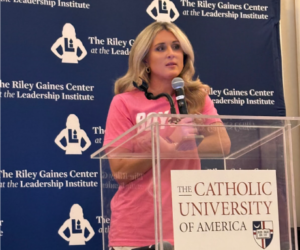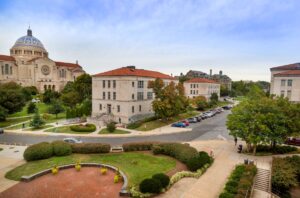Former CIA Officer Gives Talk on China

Courtesy of the International Spy Museum
By Jeremy Perillo
Former Central Intelligence Agency (CIA) Operations Officer Ken Daigler, was invited by the Catholic University Intelligence Club to discuss his expertise in counterintelligence, and his overall vast career in the CIA this past Tuesday.
Counterintelligence is defined as activities that help prevent any spying, intelligence gathering, or any other foreign sabotage by a foreign entity.
“I am what they call a classically trained case officer. Part of my training included how to receive a single-engine plane on a field at night using torches, jumping out of airplanes, and agent handling,” Daigler said. “I spent 33 years as a case officer recruiting foreign nationals of interest to the US government.”
Daigler, who published his book Spies, Traitors, and Patriots: American Intelligence in the Revolutionary War in 2014, gave the roughly 30 students a talk on intelligence, with some history of intelligence in the United States.
“In 1765, we had Sam Adams starting to work on developing a group called The Sons of Liberty,” Daigler said. “He basically built this group like a political action group, and by 1775 every single major political and military personnel in the colonies working for the continental forces were members of The Sons of Liberty.”
As an intelligence officer, Daigler worked extensively on East Asia and was the East Asia chief of counterintelligence at one point during his career. Naturally, the conversation ebbed into a question and answer on the extensiveness of China as a threat to the United States and how intelligence functions differently there.
“The Chinese are a lovely people; their history is wonderful, their culture is wonderful. Unfortunately, the Communist Party of China is not as wonderful and they have a slightly different cultural view about things like property rights and areas of research and development,” mentioned Daigler. “The United States is a warm, welcoming, and non-counterintelligence orientated society.”
Daigler argues that this point, creates a leg up for the Chinese, as the United States will never be a counterintelligence society. Our country stands for freedom of expression and the ability for people to present dissent about whether they want. The same cannot be said for Chinese citizens whose government controls their media and punishes those that speak out against the regime.
Another point that Daigler brings up is the role the Communist Party plays in China’s government.
“What do you think the main goal of the Communist Party of China is?” Daigler asked the group of students. “It’s not to sustain the whole people. It’s to sustain the party,” he chimed.
Someone swearing an oath to the People’s Liberation Army (China’s national army), swears that oath to the Communist Party of China, not to the citizens nor the Republic of China. Many of the students in the room seem shocked that there is a blatant disregard for the citizen over the party in a country that claims to be “The People’s Republic” of China.
Students found it unsettling to see the functions of the Chinese government place the Communist party in front of its citizens. It is no surprise why since 1949, the People’s Republic of China has maintained a ruthless and unfavorable opinion from most of the West, and to this day continues to be one of the United States’ fiercest competitors.







